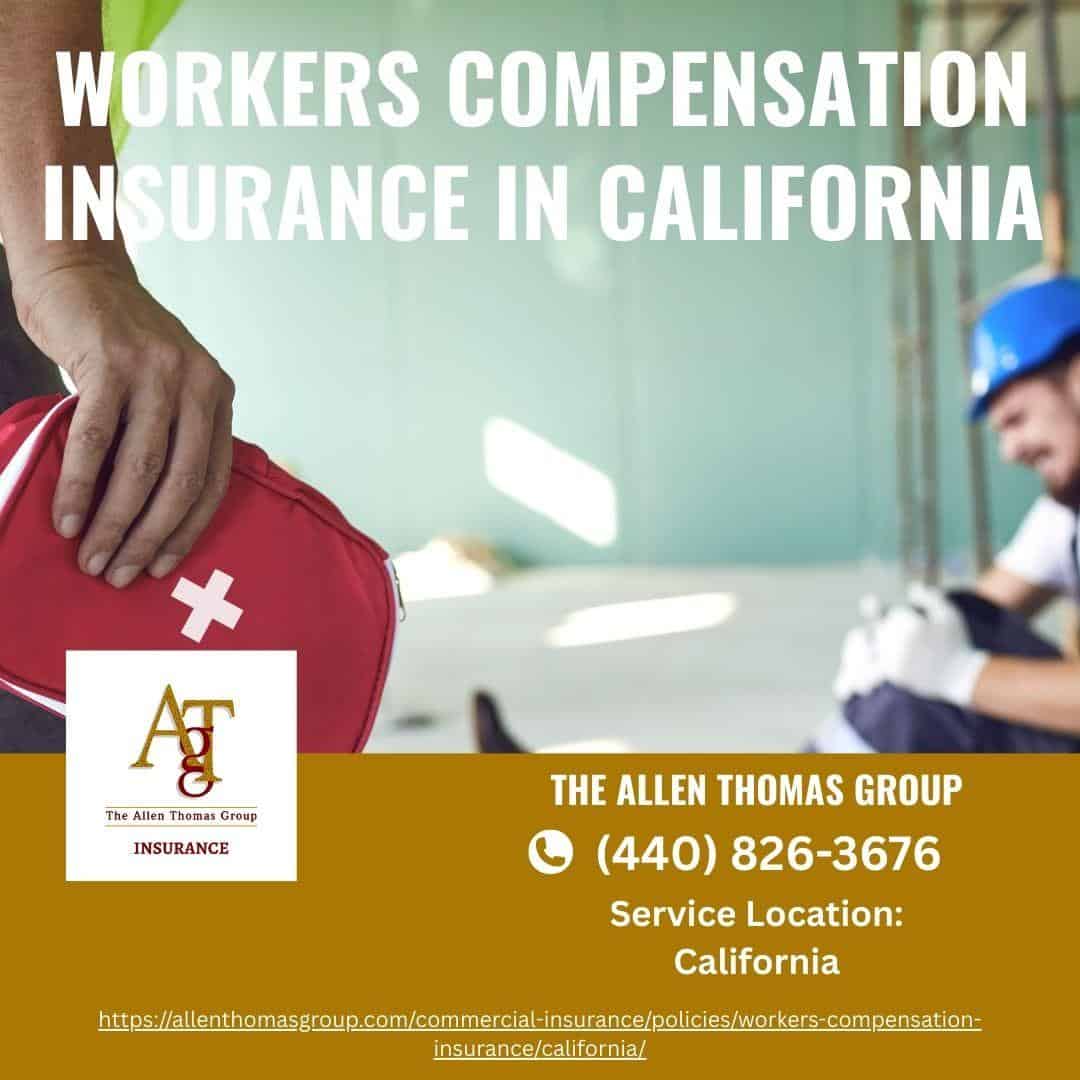Get A Precise Work Comp Insurance Quote For Your California Business Now
It Just Takes A Few Clicks
Or Give Us A Call At (440) 826-3676

Quality Workers Compensation Insurance in California From The Allen Thomas Group

Are you a California business owner trying to navigate the complex world of workers compensation insurance?
The Allen Thomas Group provides tailored workers compensation solutions that protect both your business and your employees.
With over 20 years of experience serving California employers, our commercial insurance agents understand the unique challenges you face.
Contact us for a free quote today!
Table of Contents
Understanding California Workers Compensation Insurance Requirements
California law mandates that all employers with one or more employees must carry workers compensation insurance.
This requirement applies to full-time and part-time workers, ensuring all employees receive proper protection for work-related injuries and illnesses.
Legal Mandate for California Employers
Workers compensation insurance in California functions as a no-fault system that provides medical benefits and wage replacement to employees who suffer work-related injuries.
For employers, this mandatory coverage limits liability by serving as the exclusive remedy for workplace injuries, preventing most employee lawsuits related to on-the-job accidents.
Coverage Requirements Based on Business Structure
Different business structures face varying requirements:
- Corporations and LLCs: Must provide coverage for all employees, including corporate officers and directors
- Sole proprietors and partnerships: Generally exempt if no employees, but may elect to cover themselves
- Roofers: Must carry workers compensation insurance regardless of employee status
- Independent contractors: Classification status determines coverage needs
Recent Legislative Changes (SB 216)
California’s SB 216 expanded workers compensation requirements for specific contractors even when they have no employees. This includes:
- Concrete contractors
- HVAC specialists
- Asbestos abatement professionals
- Tree service contractors
This legislation took effect in 2023, with further expansions planned for 2026. Staying current with such legal changes is vital for California business owners to maintain compliance.
Benefits Your California Employees Receive Under Workers Compensation
A comprehensive workers compensation policy provides multiple types of protection for your employees.
Your policy covers all necessary medical expenses stemming from workplace injuries or illnesses, including:
- Doctor visits and hospital stays
- Medications and medical equipment
- Physical therapy and rehabilitation services
- Ongoing treatment for chronic conditions
When workplace injuries prevent employees from working, disability benefits provide crucial financial support:
- Temporary disability benefits: Partial wage replacement during recovery
- Permanent disability benefits: Long-term compensation for permanent injuries based on severity and impact on earning capacity
For employees unable to return to their previous position, these benefits provide:
- Vocational rehabilitation services
- Education and retraining opportunities through voucher programs
- Job placement assistance
In the tragic event of a workplace fatality, dependents receive:
- Funeral expense coverage
- Financial support payments
- Ongoing dependent care benefits
The California Claims Process: Employer Responsibilities
As a California employer, you have specific obligations when an employee sustains a work-related injury.
California law establishes strict timelines for injury reporting:
- Provide claim forms to injured employees within one working day of injury notification
- Report serious injuries to Cal/OSHA immediately
- Submit employer’s report of injury to your insurance carrier promptly
You must authorize medical treatment promptly:
- Approve up to $10,000 in medical treatment within one working day of receiving a claim
- Facilitate appropriate medical care through approved provider networks
- Maintain communication with healthcare providers and claims adjusters
Proper documentation protects your business and ensures smooth claims processing:
- Maintain detailed accident reports
- Document all communications regarding claims
- Keep records of workplace safety programs and training
- Track return-to-work accommodations
Effective return-to-work programs benefit both employees and employers by:
- Reducing disability costs
- Maintaining workforce productivity
- Providing modified duty options during recovery
- Supporting employee morale and retention
Cost Factors Affecting Your Workers Compensation Premiums

Several factors determine your California workers compensation insurance costs.
Industry Risk Classification Impact
The nature of your business significantly affects premium rates:
- Construction, manufacturing, and healthcare typically face higher rates
- Office-based businesses generally enjoy lower premiums
- Classification codes assigned by NCCI or WCIRB California determine base rates
Experience Modification Rating Explained
Your claims history directly impacts your premiums through an experience modification factor:
- Fewer claims than industry average results in premium credits
- More claims than average leads to premium surcharges
- Three years of claims history determines your rating
- Effective safety programs can improve your modifier over time
Payroll Verification Process
Insurance carriers calculate premiums based on payroll figures:
- Accurate payroll reporting prevents audit surprises
- Job classification accuracy ensures proper premium calculation
- Regular payroll updates may be required for growing businesses
Loss Control Programs and Premium Reduction
Implementing safety measures can significantly reduce your costs:
- Safety training and education programs
- Hazard identification and mitigation
- Regular workplace safety inspections
- Safety committee formation and management
Penalties and Compliance: Protecting Your California Business
Non-compliance with workers compensation requirements carries severe consequences in California.
Failing to carry required workers compensation insurance results in:
- Fines up to $10,000
- Stop work orders that halt business operations
- Responsibility for all employee medical costs
- Additional assessment of up to $100,000
Beyond financial penalties, non-compliance may lead to:
- Misdemeanor or felony charges
- Potential imprisonment for up to one year
- Personal liability for business owners
- Debarment from public contracts
California actively enforces workers compensation requirements through:
- Random business inspections
- Investigation of employee complaints
- Cross-referencing of business licenses and insurance policies
- Coordination between state agencies to identify uninsured employers
Maintaining proper coverage provides critical legal protection:
- Limits employer liability for workplace injuries
- Prevents most employee lawsuits related to injuries
- Creates predictable costs for workplace accidents
- Protects business assets from catastrophic claims
Workers Compensation Insurance Options for California Employers
The State Fund serves as California’s insurer of last resort:
- Available to all California businesses
- Competitive rates for many industries
- Special programs for high-risk employers
- Dividend programs for qualifying policyholders
Many private insurers offer workers compensation policies with unique advantages:
- Specialized industry expertise
- Enhanced claims management services
- Risk management resources
- Potential premium discounts
Larger employers may qualify for self-insurance if they meet specific requirements:
- Minimum net worth and liquidity thresholds
- Claims administration capabilities
- Ability to post required security deposits
- Demonstrated financial stability
Some industries benefit from group self-insurance programs:
- Industry-specific risk pools
- Professional employer organizations (PEOs)
- Joint powers authorities for public entities
- Trade association programs
Industry-Specific Considerations for California Businesses
Different industries face unique workers compensation challenges in California.
High-Risk Industry Requirements
Businesses in high-risk sectors face additional considerations:
- Construction companies need specialized coverage for jobsite hazards
- Healthcare facilities require protection for unique exposures
- Manufacturing operations must address machinery and repetitive motion risks
- Transportation companies need coverage for driving-related injuries
Construction and Contractor Special Provisions
California’s construction industry faces specific requirements:
- CSLB license verification requires proof of workers compensation
- Owner-builders must provide coverage for all project workers
- General contractors may be liable for uninsured subcontractors
- Special classification codes apply to different construction specialties
Professional Services Coverage Needs
Office-based businesses have distinct workers compensation needs:
- Ergonomic injury prevention
- Coverage for business travel incidents
- Remote work considerations
- Mental health-related claims coverage
Small Business Considerations
Small employers in California benefit from:
- Minimum premium policies
- Pay-as-you-go options to manage cash flow
- Industry group programs
- Simplified audit procedures
Tailored Worker's Comp Insurance Solutions Built For Your Business
We know how frustrating and complex the process of finding the right business insurance can be and how it slows down your ability to care for your customers. Let us help craft a policy that works for you.

Tell us about your specific needs and we will find the right policy for you.

Review the results of our search.

We will walk you through your new policy step by step.
Our Commercial Insurance Carrier Partners
That allows us to find the best rates for your business.









The Allen Thomas Group Approach to California Workers Compensation

Workers compensation insurance isn’t just a legal requirement—it’s a critical investment in your business’s future and your employees’ wellbeing.
The Allen Thomas Group brings over two decades of specialized experience in California workers compensation to your business.
Our clients consistently report peace of mind knowing their workers compensation coverage is properly structured, compliant with California law, and priced competitively.
We handle the insurance complexities so you can focus on running your business.
Take the first step toward comprehensive protection by scheduling a no-obligation consultation with our California workers compensation specialists.
We’ll review your current coverage, identify potential gaps, and develop a customized solution that meets your specific needs and budget.
Call us today at (440) 826-3676 or click on the button below to get started.
Get More Insights On Making The Right Insurance Decision For Your Company
What is the Average Cost of Workers Compensation Insurance in California?
California employers pay approximately $1.56 per $100 of payroll for workers compensation insurance, with rates varying significantly based on industry classification and company claims history. Construction companies typically pay $6-12 per $100 in payroll while professional services businesses might pay $0.40-1.00 per $100 in payroll.
Are Employers Required to Have Workers Compensation Insurance in California?
Yes, all California employers with one or more employees must carry workers compensation insurance, with penalties for non-compliance including fines up to $10,000, stop work orders, and potential criminal charges. Certain business structures like sole proprietors without employees are exempt, except for roofers who must have coverage regardless of employee status.
What is the New Workers' Comp Law in California?
California’s SB 216 requires specific contractors including concrete, HVAC, asbestos abatement, and tree service contractors to carry workers compensation insurance even if they have no employees, with implementation beginning in 2023. This legislation will expand to include additional contractor classifications by 2026, creating stricter requirements for previously exempt businesses.
Who Pays for California Workers' Compensation?
Employers bear the entire cost of workers compensation insurance in California, as state law prohibits passing any portion of the premium expense to employees. The insurance provides medical treatment, disability benefits, and return-to-work assistance for work-related injuries while protecting businesses from most employee lawsuits related to workplace accidents.
Areas We Serve Business Owners in California
Alameda
Alhambra
Aliso Viejo
Anaheim
Antioch
Apple Valley
Arden-Arcade
Bakersfield
Baldwin Park
Beaumont
Berkeley
Brentwood
Buena Park
Burbank
Camarillo
Carlsbad
Carson
Castro Valley
Cathedral City
Chico
Chino
Chino Hills
Chula Vista
Citrus Heights
Clovis
Colton
Compton
Concord
Corona
Costa Mesa
Daly City
Davis
Delano
Diamond Bar
Downey
Dublin
Eastvale
El Cajon
El Monte
Elk Grove
Encinitas
Escondido
Fairfield
Fontana
Florence-Graham
Fontana
Fountain Valley
Fremont
Fresno
Fullerton
Garden Grove
Gilroy
Glendale
Glendora
Hanford
Hacienda Heights
Hawthorne
Hayward
Hemet
Highland
Huntington Beach
Huntington Park
Inglewood
Irvine
Jurupa Valley
La Habra
La Mesa
Laguna Niguel
Lake Elsinore
Lancaster
Lodi
Long Beach
Los Angeles
Madera
Manteca
Merced
Milpitas
Mission Viejo
Modesto
Moreno Valley
Murrieta
Napa
National City
Norwalk
Novato
Oakland
Oceanside
Ontario
Orange
Oxnard
Palo Alto
Paramount
Pasadena
Perris
Petaluma
Pico Rivera
Pittsburg
Placentia
Pleasanton
Pomona
Porterville
Redding
Redlands
Redondo Beach
Redwood City
Rialto
Richmond
Riverside
Rosemead
Roseville
Sacramento
Salinas
San Bernardino
San Buenaventura
San Clemente
San Diego
San Francisco
San Jose
San Leandro
San Marcos
San Mateo
San Rafael
San Ramon
Santa Ana
Santa Barbara
Santa Clara
Santa Clarita
Santa Cruz
Santa Maria
Santa Monica
Santa Rosa
Santee
Simi Valley
South Gate
Stockton
Sunnyvale
Temecula
Thousand Oaks
Torrance
Tracy
Tustin
Turlock
Union City
Upland
Vallejo
Victorville
Visalia
Vista
Walnut Creek
Watsonville
West Covina
Whittier
Woodland
Yorba Linda
Yucaipa
Yuba City


